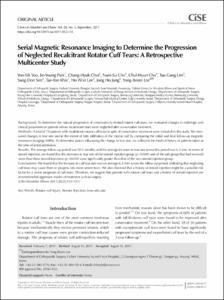KUMEL Repository
1. Journal Papers (연구논문)
1. School of Medicine (의과대학)
Dept. of Orthopedic Surgery (정형외과학)
Serial Magnetic Resonance Imaging to Determine the Progression of Neglected Recalcitrant Rotator Cuff Tears: A Retrospective Multicenter Study
- Keimyung Author(s)
- Cho, Chul Hyun
- Department
- Dept. of Orthopedic Surgery (정형외과학)
- Journal Title
- Clinics in Shoulder and Elbow
- Issued Date
- 2017
- Volume
- 20
- Issue
- 3
- Keyword
- Rotator cuff injury; Steroid; Injection; Intra-articular
- Abstract
- Background: To determine the natural progression of conservatively treated rotator cuff tears, we evaluated changes in radiologic and clinical parameters in patients whose recalcitrant tears were neglected after conservative treatment.
Methods: A total of 73 patients with recalcitrant rotator cuff tears in spite of conservative treatment were included in this study. We measured changes in tear size and in the extent of fatty infiltration of the rotator cuff by comparing the initial and final follow-up magnetic resonance imagings (MRIs). To determine factors influencing the change in tear size, we collected the medical history of patients taken at the time of initial admission.
Results: The average follow-up period was 20.1 months, and the average increase in tear size across this period was 6.2 mm. In terms of steroid injection, we found that the increases in tear size of the steroid injection group (p=0.049) and of the sub-group that had received more than three steroid injections (p=0.010) were significantly greater than that of the non-steroid injection group.
Conclusions: We found that the increase in cuff tear size was on average 6.2 mm across the follow-up period, indicating that neglecting cuff tears may cause them to progress into more severe tears. We also observed that a history of steroid injection might be a possible risk factor for a worse prognosis of cuff tears. Therefore, we suggest that patients with rotator cuff tears and a history of steroid injection are recommended aggressive modes of treatment such as surgery.
- Keimyung Author(s)(Kor)
- 조철현
- Publisher
- School of Medicine (의과대학)
- Citation
- Yoo, Yon-Sik et al. (2017). Serial Magnetic Resonance Imaging to Determine the Progression of Neglected Recalcitrant Rotator Cuff Tears: A Retrospective Multicenter Study. Clinics in Shoulder and Elbow, 20(3), 133–137. doi: 10.5397/cise.2017.20.3.133
- Type
- Article
- ISSN
- 2383-8337
- Appears in Collections:
- 1. School of Medicine (의과대학) > Dept. of Orthopedic Surgery (정형외과학)
- 파일 목록
-
-
Download
 oak-2018-1006.pdf
기타 데이터 / 271.55 kB / Adobe PDF
oak-2018-1006.pdf
기타 데이터 / 271.55 kB / Adobe PDF
-
Items in Repository are protected by copyright, with all rights reserved, unless otherwise indicated.